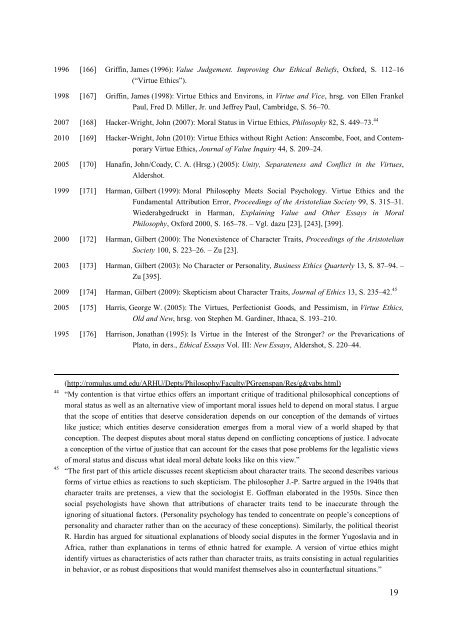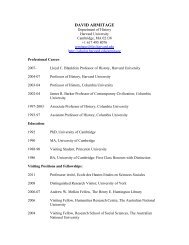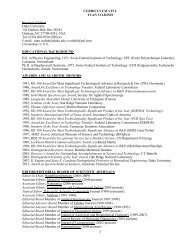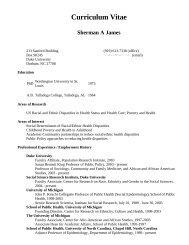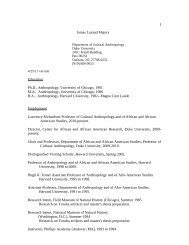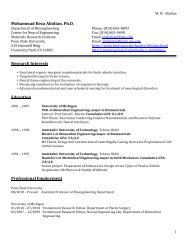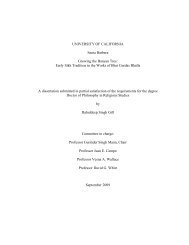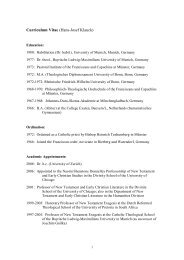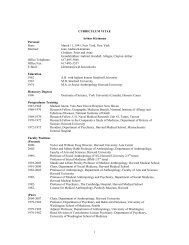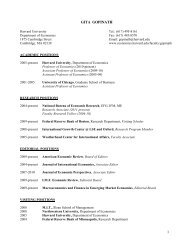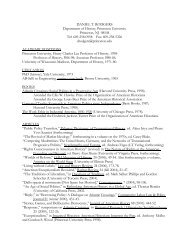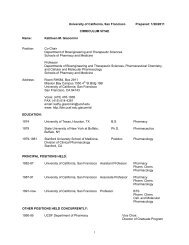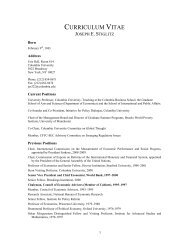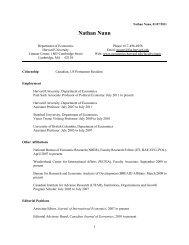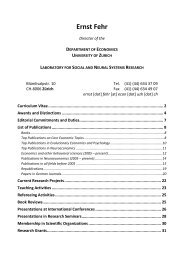Literatur zur Tugendethik Bibliography on Virtue ... - Academic Room
Literatur zur Tugendethik Bibliography on Virtue ... - Academic Room
Literatur zur Tugendethik Bibliography on Virtue ... - Academic Room
- No tags were found...
Create successful ePaper yourself
Turn your PDF publications into a flip-book with our unique Google optimized e-Paper software.
1996 [166] Griffin, James (1996): Value Judgement. Improving Our Ethical Beliefs, Oxford, S. 112–16(“<strong>Virtue</strong> Ethics”).1998 [167] Griffin, James (1998): <strong>Virtue</strong> Ethics and Envir<strong>on</strong>s, in <strong>Virtue</strong> and Vice, hrsg. v<strong>on</strong> Ellen FrankelPaul, Fred D. Miller, Jr. und Jeffrey Paul, Cambridge, S. 56–70.2007 [168] Hacker-Wright, John (2007): Moral Status in <strong>Virtue</strong> Ethics, Philosophy 82, S. 449–73. 442010 [169] Hacker-Wright, John (2010): <strong>Virtue</strong> Ethics without Right Acti<strong>on</strong>: Anscombe, Foot, and C<strong>on</strong>temporary<strong>Virtue</strong> Ethics, Journal of Value Inquiry 44, S. 209–24.2005 [170] Hanafin, John/Coady, C. A. (Hrsg.) (2005): Unity, Separateness and C<strong>on</strong>flict in the <strong>Virtue</strong>s,Aldershot.1999 [171] Harman, Gilbert (1999): Moral Philosophy Meets Social Psychology. <strong>Virtue</strong> Ethics and theFundamental Attributi<strong>on</strong> Error, Proceedings of the Aristotelian Society 99, S. 315–31.Wiederabgedruckt in Harman, Explaining Value and Other Essays in MoralPhilosophy, Oxford 2000, S. 165–78. – Vgl. dazu [23], [243], [399].2000 [172] Harman, Gilbert (2000): The N<strong>on</strong>existence of Character Traits, Proceedings of the AristotelianSociety 100, S. 223–26. – Zu [23].2003 [173] Harman, Gilbert (2003): No Character or Pers<strong>on</strong>ality, Business Ethics Quarterly 13, S. 87–94. –Zu [395].2009 [174] Harman, Gilbert (2009): Skepticism about Character Traits, Journal of Ethics 13, S. 235–42. 452005 [175] Harris, George W. (2005): The <strong>Virtue</strong>s, Perfecti<strong>on</strong>ist Goods, and Pessimism, in <strong>Virtue</strong> Ethics,Old and New, hrsg. v<strong>on</strong> Stephen M. Gardiner, Ithaca, S. 193–210.1995 [176] Harris<strong>on</strong>, J<strong>on</strong>athan (1995): Is <strong>Virtue</strong> in the Interest of the Str<strong>on</strong>ger? or the Prevaricati<strong>on</strong>s ofPlato, in ders., Ethical Essays Vol. III: New Essays, Aldershot, S. 220–44.4445(http://romulus.umd.edu/ARHU/Depts/Philosophy/Faculty/PGreenspan/Res/g&vabs.html)“My c<strong>on</strong>tenti<strong>on</strong> is that virtue ethics offers an important critique of traditi<strong>on</strong>al philosophical c<strong>on</strong>cepti<strong>on</strong>s ofmoral status as well as an alternative view of important moral issues held to depend <strong>on</strong> moral status. I arguethat the scope of entities that deserve c<strong>on</strong>siderati<strong>on</strong> depends <strong>on</strong> our c<strong>on</strong>cepti<strong>on</strong> of the demands of virtueslike justice; which entities deserve c<strong>on</strong>siderati<strong>on</strong> emerges from a moral view of a world shaped by thatc<strong>on</strong>cepti<strong>on</strong>. The deepest disputes about moral status depend <strong>on</strong> c<strong>on</strong>flicting c<strong>on</strong>cepti<strong>on</strong>s of justice. I advocatea c<strong>on</strong>cepti<strong>on</strong> of the virtue of justice that can account for the cases that pose problems for the legalistic viewsof moral status and discuss what ideal moral debate looks like <strong>on</strong> this view.”“The first part of this article discusses recent skepticism about character traits. The sec<strong>on</strong>d describes variousforms of virtue ethics as reacti<strong>on</strong>s to such skepticism. The philosopher J.-P. Sartre argued in the 1940s thatcharacter traits are pretenses, a view that the sociologist E. Goffman elaborated in the 1950s. Since thensocial psychologists have shown that attributi<strong>on</strong>s of character traits tend to be inaccurate through theignoring of situati<strong>on</strong>al factors. (Pers<strong>on</strong>ality psychology has tended to c<strong>on</strong>centrate <strong>on</strong> people’s c<strong>on</strong>cepti<strong>on</strong>s ofpers<strong>on</strong>ality and character rather than <strong>on</strong> the accuracy of these c<strong>on</strong>cepti<strong>on</strong>s). Similarly, the political theoristR. Hardin has argued for situati<strong>on</strong>al explanati<strong>on</strong>s of bloody social disputes in the former Yugoslavia and inAfrica, rather than explanati<strong>on</strong>s in terms of ethnic hatred for example. A versi<strong>on</strong> of virtue ethics mightidentify virtues as characteristics of acts rather than character traits, as traits c<strong>on</strong>sisting in actual regularitiesin behavior, or as robust dispositi<strong>on</strong>s that would manifest themselves also in counterfactual situati<strong>on</strong>s.”19


